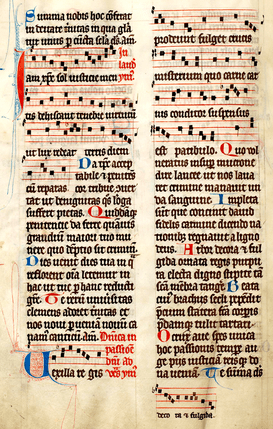
 ICHARD NIXON was not the only president of the United States. Reagan, Lincoln, Kennedy, and many others cannot be forgotten. Nixon was but a small part of the presidential legacy. Similarly, many choirs wrongly treat Palestrina’s “O Crux Ave” as if it were its own entity. In fact, it’s only one section of Palestrina’s setting of the Vexilla Regis hymn. Failure to grasp this is a grave error.
ICHARD NIXON was not the only president of the United States. Reagan, Lincoln, Kennedy, and many others cannot be forgotten. Nixon was but a small part of the presidential legacy. Similarly, many choirs wrongly treat Palestrina’s “O Crux Ave” as if it were its own entity. In fact, it’s only one section of Palestrina’s setting of the Vexilla Regis hymn. Failure to grasp this is a grave error.
It is not possible to appreciate Palestrina’s setting without being familiar with the Gregorian version. Please take a minute to become familiar with the melody, by means of this video, this Mp3, or even this organ piece which uses themes from Vexilla. Once you’ve done that, you’re ready to listen to what Palestrina did with the sixth verse (placing the Vexilla melody in the Soprano):
* * PDF Download • O Crux Ave (Palestrina)
* * Mp3 Recording • O Crux Ave (Palestrina)
Here are some practice recordings to help your choir learn:
WE WILL SOON POST more sections from this hymn as set by Palestrina. Some of you know I transcribed all four volumes of Carl Proske’s “Musica Divina” collection in 2002. When I discovered this beautiful setting by Palestrina—all the parts, not just the O CRUX AVE—I was so impressed. I never had a chance to teach this piece to a choir until this year! If you view the original version as found in Proske, you will see why I felt the need to transcribe it!

Fun Fact :
If you look carefully at the version in the Liber Usualis, you’ll see that they broke a neume. I’ve only ever seen one other instance where a neume is broken. Normally, hypermetric syllables are elided (although some choirs will add a note). This is not a “Solesmes thing” because the 1953 Schwann version does same thing. The 1940s NOH seems unaware of this. I cannot really tell what the 1892 Pustet version does. The 1891 Antiphonale by Pothier does not appear to indicate that the neume should be broken. The 14th-century German manuscript in the upper right indicates that their singers had difficulties here, so somebody “wrote out” the notes in the margin—truly fascinating!

Notice the 1896 Graduel romain à l’usage de la province écclésiastique de Québec does the same thing:

